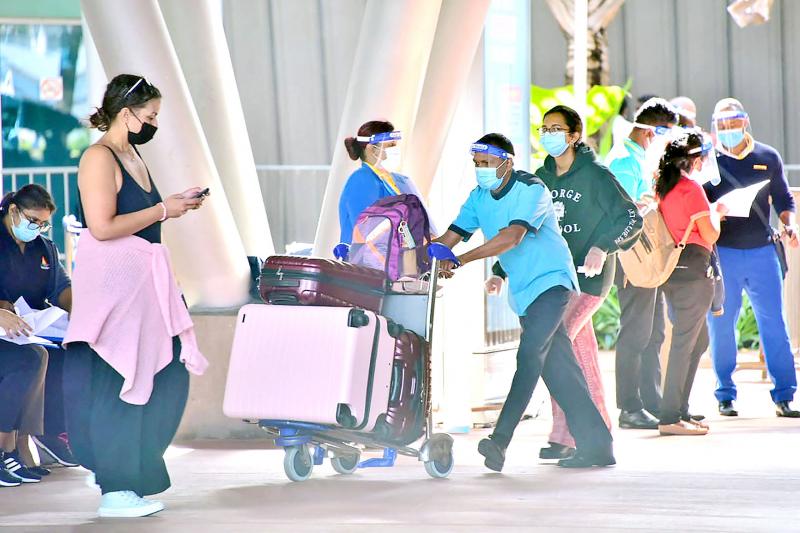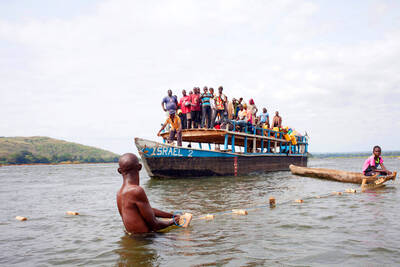Hospitals are overwhelmed, ventilators are difficult to find and there is no longer enough space at the main cemetery for COVID-19 victims in Mauritius.
Barely three weeks before it fully opens its doors to international travelers at the start of the peak tourist season, the island nation is struggling with an alarming explosion in COVID-19 infections and deaths.
In just two months, cases have jumped more than fivefold to more than 12,600 as of Friday, by far the largest increase across Africa during this period, data compiled by Agence France-Presse showed.

Photo: AFP
Since the pandemic started, Mauritius has recorded 1,005 cases of COVID-19 per 100,000 inhabitants, far higher than the continent’s average of 598.
The crisis has become so acute that 74-year-old former Mauritian prime minister Navin Ramgoolam has flown to India for COVID-19 treatment, and the opposition leader has discussed his struggle to find a bed for an ailing friend.
“People do not realize how bad the situation is,” said one nurse at a COVID-19 treatment center, speaking on condition of anonymity for fear of possible reprisals. “We are already above capacity.”
In July, the Indian Ocean holiday destination, renowned for its white sandy beaches and turquoise waters, partly reopened to vaccinated international visitors.
However, they had to remain in “resort bubbles” for 14 days before being allowed to venture further afield, provided they had a negative polymerase chain reaction test.
The government this month reduced that timeframe to seven days ahead of a full reopening planned for Oct. 1, when tourists would be free to explore the island as long as they test negative up to 72 hours before arrival.
“The situation is worsening,” one doctor said on condition of anonymity, adding that medical professionals had been instructed not to talk about the crisis.
“The priority of the government is to ensure a smooth opening of the borders on Oct. 1,” the doctor said.
The government has not given any explanation for the surge, but local media reports speak of people ignoring social distancing and not following precautions after getting inoculated.
The authorities had ordered people in some sectors to have COVID-19 vaccines, or risk hefty fines and jail terms of up to five years.
As of Saturday, 61 percent of the population was fully vaccinated, but the virus situation remains bleak.
Bernard, a worker at Bigara Cemetery on the main island, said that the area reserved for COVID-19 victims is full.
The dead are being buried at another graveyard in the north of the island, but locals are furious, saying that COVID-19 victims are being buried too close to their homes.
L’Express newspaper reported that police had to be summoned last week when some youths began throwing stones at health workers who were burying the dead at Bois-Marchand Cemetery.
The authorities have been slow to paint a clear picture of the pandemic death toll, and announced a sharp revision to official figures on Friday, from 34 to 89.
The Mauritian Ministry of Health explained its initial calculations by saying that most of the 89 fatalities were due to comorbidities and not directly caused by COVID-19.
Locals are conflicted about the relaxation of restrictions, with tourism contributing 25 percent of the archipelago’s GDP prior to the pandemic.
“We had closed the country, but, despite this, the number of cases exploded,” said taxi driver Paul Pierre, who said that the prospect of a tourist surge made him “shudder.”
Hotel receptionist Diana Mootoosamy echoed his fears, saying that “suddenly we find ourselves without a safety net.”
“By welcoming tourists, are we going to attract foreign exchange or [SARS-CoV-2] variants?” she asked.
Others have said that the economy, which shrank by 15 percent during the past fiscal year, desperately needs a boost.
“My restaurant has been empty since March 2020. If the tourists don’t come back, I’ll have to put the key under the doormat,” restaurateur John Beeharry said.
The country’s healthcare system is struggling to cope.
Mauritian Leader of the Opposition Xavier Duval rang alarm bells over his “traumatic” hunt earlier this month for a hospital bed with a ventilator for a close friend.
With family members in tears, Duval tried several private clinics and the main hospital with no luck, before one center agreed to admit his friend — but only for 48 hours.
“All this indicates that the system is overwhelmed,” he said, calling the situation “alarming.”
“I’m afraid Mauritius will come to a stage where we might need to decide who will get the air supply and who will have to die,” he said.

‘IN A DIFFERENT PLACE’: The envoy first visited Shanghai, where he attended a Chinese basketball playoff match, and is to meet top officials in Beijing tomorrow US Secretary of State Antony Blinken yesterday arrived in China on his second visit in a year as the US ramps up pressure on its rival over its support for Russia while also seeking to manage tensions with Beijing. The US diplomat tomorrow is to meet China’s top brass in Beijing, where he is also expected to plead for restraint as Taiwan inaugurates president-elect William Lai (賴清德), and to raise US concerns on Chinese trade practices. However, Blinken is also seeking to stabilize ties, with tensions between the world’s two largest economies easing since his previous visit in June last year. At the

UNSETTLING IMAGES: The scene took place in front of TV crews covering the Trump trial, with a CNN anchor calling it an ‘emotional and unbelievably disturbing moment’ A man who doused himself in an accelerant and set himself on fire outside the courthouse where former US president Donald Trump is on trial has died, police said yesterday. The New York City Police Department (NYPD) said the man was declared dead by staff at an area hospital. The man was in Collect Pond Park at about 1:30pm on Friday when he took out pamphlets espousing conspiracy theories, tossed them around, then doused himself in an accelerant and set himself on fire, officials and witnesses said. A large number of police officers were nearby when it happened. Some officers and bystanders rushed

Beijing is continuing to commit genocide and crimes against humanity against Uyghurs and other Muslim minorities in its western Xinjiang province, U.S. Secretary of State Antony Blinken said in a report published on Monday, ahead of his planned visit to China this week. The State Department’s annual human rights report, which documents abuses recorded all over the world during the previous calendar year, repeated language from previous years on the treatment of Muslims in Xinjiang, but the publication raises the issue ahead of delicate talks, including on the war in Ukraine and global trade, between the top U.S. diplomat and Chinese

RIVER TRAGEDY: Local fishers and residents helped rescue people after the vessel capsized, while motorbike taxis evacuated some of the injured At least 58 people going to a funeral died after their overloaded river boat capsized in the Central African Republic’s (CAR) capital, Bangui, the head of civil protection said on Saturday. “We were able to extract 58 lifeless bodies,” Thomas Djimasse told Radio Guira. “We don’t know the total number of people who are underwater. According to witnesses and videos on social media, the wooden boat was carrying more than 300 people — some standing and others perched on wooden structures — when it sank on the Mpoko River on Friday. The vessel was heading to the funeral of a village chief in